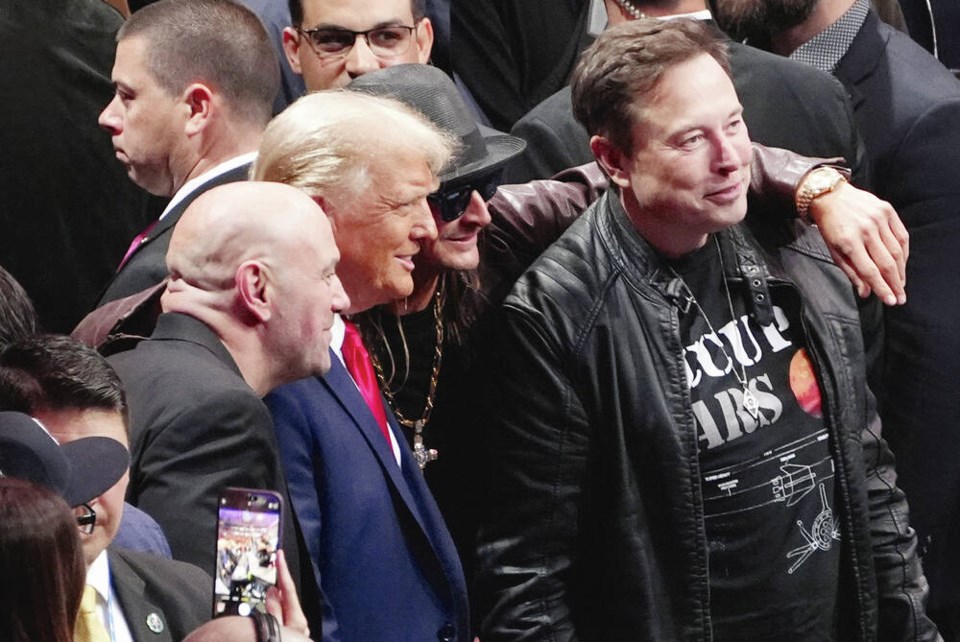In the aftermath of Nov. 5, many are wondering what the next four years will bring.
Among the questions being asked are what will happen under the coming U.S. administration with all the legal action and regulations relating to social media that are either in the works or being prepared.
The role tech giants played in the recent U.S. election is no secret. Elon Musk spent an estimated $200 million US on the president-elect’s campaign and provided support via X, the social-media platform formerly known as Twitter that the billionaire bought two years ago.
The V.P.-elect’s short venture-capitalist career and his connections to deep pockets in Silicon Valley, particularly to many of those who made their first squillions through PayPal, reinforce that support.
Of course, not all Big Tech players support the Republicans or took sides in the campaign. But those that did likely will see their investments pay off.
Trump demonstrated in 2016-2020 his quid pro quo, or transactional, approach to business, life and so on. He is known to reward those who do him favours.
And many opportunities for reward and returned favours have emerged since Trump first took office and the Facebook–Cambridge Analytica scandal became public.
That brouhaha initiated a first and very public calling-to-account for big social-media companies, with Facebook owner Mark Zuckerberg called to answer before U.S. Congress, Canada’s Parliament, the European Parliament, and others, for his company’s role in the scandal.
Among the speed bumps to maximizing profits that social-media companies face today is a U.S.-based lawsuit filed in the Los Angeles County Superior Court in October on behalf of 11 families that say their children suffered physical and mental harms because of social-media platforms.
The families include those of Amanda Todd, the B.C. 15-year-old who detailed in 2012 the relentless bullying and extortion she’d faced on social media, then died by suicide, and of Harry Burke, the 17-year-old Prince Edward Island teen who was sextorted for money and died by suicide last year.
The lawsuit names tech juggernauts Meta — parent company of Facebook and Instagram — Snapchat, TikTok’s parent company ByteDance, Discord and Google, which owns YouTube.
The suit alleges that the companies knowingly designed and marketed defective products to kids in order to boost engagement numbers.
More than 200 school districts, including the public school district in Seattle, have launched recent and controversial lawsuits in the U.S. against social-media companies, seeking to hold them accountable for the mental-health crisis among youth.
Ontario’s largest school boards have launched a similar, $4.5-billion Canada-wide class-action suit. The school boards allege that by deliberately engineering highly addictive characteristics into the platforms, the defendant social-media companies have imposed on teachers disruptive and unsafe changes in student behaviour through the design of their addictive and mental-health damaging products.
This summer, a Montreal-based law firm filed an application for authorization by the Quebec Superior Court to institute a Canada-wide class action against Facebook, Facebook Messenger, Instagram, TikTok, X/Twitter, YouTube, Snapchat and Reddit.
Seeking damages for all individuals who had an account on these platforms, the proposed class action alleges the defendants designed, marketed and promoted platforms that are inherently harmful to the public, while also keeping from social-network users the information they need to make an informed choice when contracting with the defendants.
A number of countries are also working to hold online platforms accountable for the content they host. Parliament’s proposed Online Harms Act and related amendments to the Criminal Code, the Canadian Human Rights Act would serve a baseline standard for online platforms to keep Canadians safe and would hold online.
The E.U.’s Digital Services Act, which came into force in late 2022, is intended to serve the same purpose. In the U.S., the Kids Online Safety Act would create a “duty of care,” a legal term that requires companies to take reasonable steps to prevent harm.
The E.U. now requires tech companies without physical offices there to pay taxes to the E.U. on the billions of dollars the companies make in the E.U. Canada has been negotiating for a similar multi-national agreement that would apply here.
Such attempts to hold big social-media companies accountable provide many opportunities for the incoming Trump administration to reward its tech supporters. The vehicles used could include tariffs, threats of tariffs, protective legislation, court-based actions, and more.
Exactly what quo Trump’s tech supporters will see in return for their many invested quid will be made clear in the coming 50 months.



